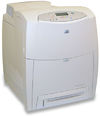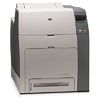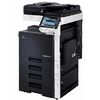Printing
From Molecular Modeling Wiki
(→General) |
(→Available printers) |
||
| Line 81: | Line 81: | ||
|'''HPLJ4005''' | |'''HPLJ4005''' | ||
|entrance | |entrance | ||
| - | |} | + | |- |
| + | !align="left"|Minolta bizhub C220 | ||
| + | |[[Image:bizhubc220.jpg|frameless|100px]] | ||
| + | |laser color | ||
| + | |yes | ||
| + | |none | ||
| + | |entrance|} | ||
[[Category:LAN]] | [[Category:LAN]] | ||
Revision as of 10:36, 13 December 2011
Contents |
General
All users connected to the local network can use all common printers (see the table of printers below). All standard printers (all HP LaserJet) are connected to the clara server and printing is only possible though this server. The big multifunction printer/scanner/copier Minolta bizhub C220 is not connected to the clara server and printing must be configured to send jobs directly to the printer (see below).
| It is not possible to print directly to any of the standard printers (all HP LaserJet, not Minolta bizhub C220) although they are connected to the local network! Printer configuration on your computer must be always set to send all jobs to clara - jobs sent directly to printers will never be processed. |
Setup
Configure printers on Linux
It is usually not necessary to install or configure printers under Linux. You must have CUPS software package installed to be able to print, but it is automatically installed and configured when installing most of the modern Linux distributions.
To check / modify printing setup and to see if all network printers are visible on your system, use Printer Control Panel, System Configuration or whichever utility / configuration application you distribution offers. All printers should appear as network printers on clara server with queue names as listed in the table below.
Configure printers on Windows
Installing printer
For some reason, the best installation practice to install a network printer on Windows (at least since Windows XP) operating system is to use the following trick: do not install these printers as network printers, install them as local printers instead. To do so, follow these instructions (for Windows XP; modify as needed for Windows Vista or Windows 7):
- Open Control Pannel and select Printers and Faxes.
- Select Add a printer - an Add Printer Wizard appears.
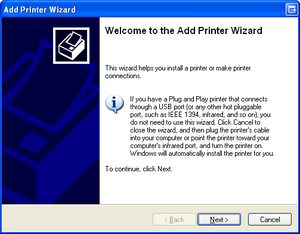
- When asked, select Local printer attached to this computer and deselect Automatically detect and install my Plug and Play printer. Click Next.
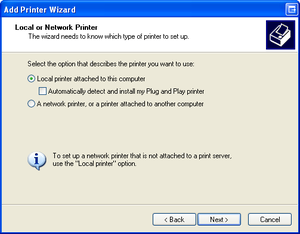
- Select Create a new port and choose Local Port in the drop down list.
- When Port Name form appears, enter the port name in the following form
\\CLARA\HPxxxx
replacing xxxx with the queue name according to the table below.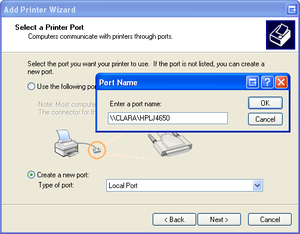
- Select the proper driver in the table that follows or click on Have Disk ...' and browse to
\\CLARA\COMMON\ADMIN\DRIVERS
to find a driver.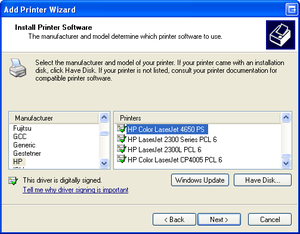
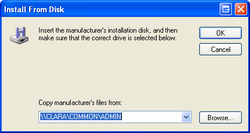
- Continue with the wizard and answer the questions that follow (say Do not share this printer when asked).
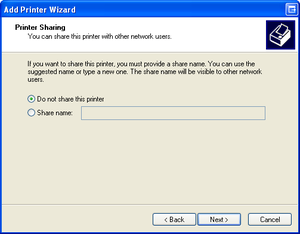
- To confirm all settings, click Finish.
Configuring printer
As the printers are connected to the clara server, the client's PC does not get any information about the printer capabilities automatically and must be entered manually. Fortunately, the only parameter that needs to be set this way is the presence of duplex units the printer; on the other hand, if this parameter is not changed, user is not able to print double-sided documents. To change duplex unit setting, follow the instructions:
- Open Control Pannel and select Printers and Faxes.
- Right-click on the selected printer and select Properties. According to the printer type and the driver version the dialog that opens does not need to be exactly same as on the following picture - it should, however, be somehow similar.
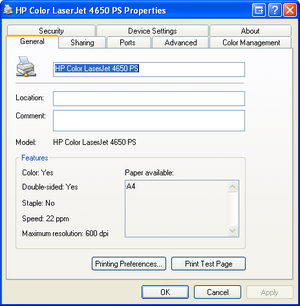
- Select Device Settings tab and find Duplex Unit item. Change the setting to Installed.
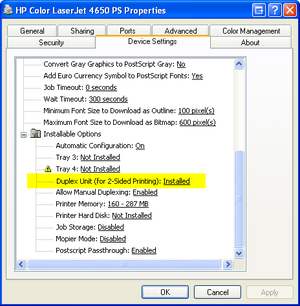
- Select the General tab and click on Printing Preferences...
- Select Finishing tab and try to set Print on Both Sides. If you leave it checked here, it will stay as your default. You can always change this setting when printing a document.
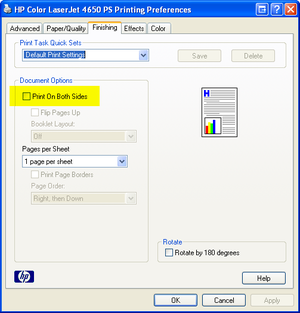
Available printers
This is the complete list of available printers.


